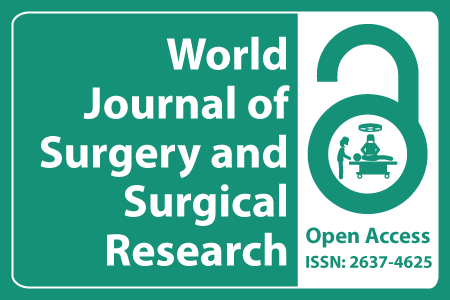
Journal Basic Info
- Impact Factor: 1.989**
- H-Index: 6
- ISSN: 2637-4625
- DOI: 10.25107/2637-4625
Major Scope
- Pediatric Surgery
- Ophthalmology & Eye Surgery
- Spine Surgery
- Robotic Surgery
- Anesthesiology
- General Surgery
- Surgical Oncology
- Vascular Surgery
Abstract
Citation: World J Surg Surg Res. 2020;3(1):1203.DOI: 10.25107/2637-4625.1203
Analysis of Predictive Factors for Morbidity after Hepatectomy in Elderly Patients
Takuya Kato, Masaru Inagaki*, Koji Kitada, Naoyuki Tokunaga, Yuich Yasui, Yusuke Yoshida, Ryosuke Hamano, Hideaki Miyaso, Yosuke Tsunemitsu, Shinya Otsuka and Kazuhide Iwakawa
Department of Gastroenterological Surgery, Fukuyama Medical Center, Japan
*Correspondance to: Masaru Inagaki
PDF Full Text Research Article | Open Access
Abstract:
Background: It is controversial whether hepatectomy is safe for the elderly, particularly the extreme
elderly (older than 80 years). In this study, we analyzed risk factors for morbidity and the prognosis
of elderly hepatectomy patients.
Methods: We retrospectively reviewed 81 patients of advanced age (>75 years) who had undergone
hepatectomy for malignant tumors at our institution between 2010 and 2017. We evaluated
morbidity according to Clavien-Dindo classification (greater than IIIa) and prognosis. Factors were
compared between patients aged 75 to 79 years (Group I) and patients over 80 years (Group II).
Results: Thirty-nine patients (48%) were classified in Group II. Compared to Group I, Group
II had higher female cases, transfusion during surgery, and discharge outcome (transferred to
another hospital, rather than released) and a lower nutritional score. Meanwhile, there were no
significant differences with performance status, number of comorbidities, surgical procedure, blood
loss, operating time, hospitalization period, or frequency of delirium. The complications of those
with grade IIIa or higher were significantly increased in Group II. Age, surgical procedure, liver
function, respiratory function, operating time, and blood loss were risk factors for morbidities in the
univariate analysis. Age was the strongest risk factor in the multivariate analysis (odds ratio, 10.4;
95% confidence interval, 1.44-74.7; P=0.020). However, no significant correlation between overall
survival and age was found.
Conclusion: Age affected the morbidity of hepatectomy, but the prognosis was similar between
extreme elderly patients and relatively elderly patients. Under appropriate perioperative care,
hepatectomy can be safely performed in elderly patients.
Keywords:
Hepatectomy; Elderly patients; Morbidity; Prognosis
Cite the Article:
Kato T, Inagaki M, Kitada K, Tokunaga N, Yasui Y, Yoshida Y, et al. Analysis of Predictive Factors for Morbidity after Hepatectomy in Elderly Patients. World J Surg Surgical Res. 2020; 3: 1203..













